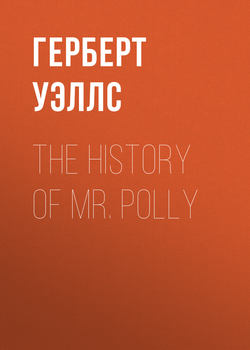Читать книгу The History of Mr. Polly - Герберт Уэллс, Герберт Джордж Уэллс - Страница 14
Chapter the Fourth
Mr. Polly an Orphan
III
ОглавлениеAll the preparations for the funeral ran easily and happily under Mrs. Johnson’s skilful hands. On the eve of the sad event she produced a reserve of black sateen, the kitchen steps and a box of tin-tacks, and decorated the house with festoons and bows of black in the best possible taste. She tied up the knocker with black crape, and put a large bow over the corner of the steel engraving of Garibaldi, and swathed the bust of Mr. Gladstone, that had belonged to the deceased, with inky swathings. She turned the two vases that had views of Tivoli and the Bay of Naples round, so that these rather brilliant landscapes were hidden and only the plain blue enamel showed, and she anticipated the long-contemplated purchase of a tablecloth for the front room, and substituted a violet purple cover for the now very worn and faded raptures and roses in plushette that had hitherto done duty there. Everything that loving consideration could do to impart a dignified solemnity to her little home was done.
She had released Mr. Polly from the irksome duty of issuing invitations, and as the moments of assembly drew near she sent him and Mr. Johnson out into the narrow long strip of garden at the back of the house, to be free to put a finishing touch or so to her preparations. She sent them out together because she had a queer little persuasion at the back of her mind that Mr. Polly wanted to bolt from his sacred duties, and there was no way out of the garden except through the house.
Mr. Johnson was a steady, successful gardener, and particularly good with celery and peas. He walked slowly along the narrow path down the centre pointing out to Mr. Polly a number of interesting points in the management of peas, wrinkles neatly applied and difficulties wisely overcome, and all that he did for the comfort and propitiation of that fitful but rewarding vegetable. Presently a sound of nervous laughter and raised voices from the house proclaimed the arrival of the earlier guests, and the worst of that anticipatory tension was over.
When Mr. Polly re-entered the house he found three entirely strange young women with pink faces, demonstrative manners and emphatic mourning, engaged in an incoherent conversation with Mrs. Johnson. All three kissed him with great gusto after the ancient English fashion. “These are your cousins Larkins,” said Mrs. Johnson; “that’s Annie (unexpected hug and smack), that’s Miriam (resolute hug and smack), and that’s Minnie (prolonged hug and smack).”
“Right-O,” said Mr. Polly, emerging a little crumpled and breathless from this hearty introduction. “I see.”
“Here’s Aunt Larkins,” said Mrs. Johnson, as an elderly and stouter edition of the three young women appeared in the doorway.
Mr. Polly backed rather faint-heartedly, but Aunt Larkins was not to be denied. Having hugged and kissed her nephew resoundingly she gripped him by the wrists and scanned his features. She had a round, sentimental, freckled face. “I should ’ave known ’im anywhere,” she said with fervour.
“Hark at mother!” said the cousin called Annie. “Why, she’s never set eyes on him before!”
“I should ’ave known ’im anywhere,” said Mrs. Larkins, “for Lizzie’s child. You’ve got her eyes! It’s a Resemblance! And as for never seeing ’im– I’ve dandled him, Miss Imperence. I’ve dandled him.”
“You couldn’t dandle him now, Ma!” Miss Annie remarked with a shriek of laughter.
All the sisters laughed at that. “The things you say, Annie!” said Miriam, and for a time the room was full of mirth.
Mr. Polly felt it incumbent upon him to say something. “My dandling days are over,” he said.
The reception of this remark would have convinced a far more modest character than Mr. Polly that it was extremely witty.
Mr. Polly followed it up by another one almost equally good. “My turn to dandle,” he said, with a sly look at his aunt, and convulsed everyone.
“Not me,” said Mrs. Larkins, taking his point, “thank you,” and achieved a climax.
It was queer, but they seemed to be easy people to get on with anyhow. They were still picking little ripples and giggles of mirth from the idea of Mr. Polly dandling Aunt Larkins when Mr. Johnson, who had answered the door, ushered in a stooping figure, who was at once hailed by Mrs. Johnson as “Why! Uncle Pentstemon!” Uncle Pentstemon was rather a shock. His was an aged rather than venerable figure; Time had removed the hair from the top of his head and distributed a small dividend of the plunder in little bunches carelessly and impartially over the rest of his features; he was dressed in a very big old frock coat and a long cylindrical top hat, which he had kept on; he was very much bent, and he carried a rush basket from which protruded coy intimations of the lettuces and onions he had brought to grace the occasion. He hobbled into the room, resisting the efforts of Johnson to divest him of his various encumbrances, halted and surveyed the company with an expression of profound hostility, breathing hard. Recognition quickened in his eyes.
